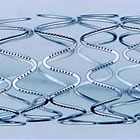|
Medtronic Begins Testing a "Drug-Filled Stent"
Novel Design Elutes Drug Through Holes Without Need for Polymer
|
 |

Drug-filled stent, showing elution holes |
March 14, 2015 -- One of the big topics under discussion at today's session of the annual American College of Cardiology meeting in San Diego was the relationship and balance between prolonged dual antiplatelet therapy (DAPT) of a year or more, prescribed to prevent the incidence of stent thrombosis in drug-eluting stents (DES), and bleeding caused by those drugs. In fact, this issue is a major topic at virtually every cardiology meeting.
In a session this afternoon, Harvard-based cardiologist Dr. Donald Cutlip suggested that bare metal stents were still the best choice for patients at high risk of bleeding complications.
The reason is simple: bare metal stents do not require such prolonged DAPT.
A number of clinical data have shown no increased risk in early cessation of DAPT with the newer second-generation of DES and the European regulatory agency has included this fact in the package label. The ZEUS study just published in the Journal of the American College of Cardiology, and which was presented at last year's meeting also showed no such problems and, in fact, concluded that the drug-eluting Endeavor stent was superior to bare metal, mainly because of the drug effect on reducing restenosis.
Adding to the mix is a novel stent concept, the "drug-filled stent" or DFS, the first study of which was announced today by Medtronic. It is both a drug-eluting stent AND a bare metal stent, utilizing a stent construction that Medtronic currently uses in its Resolute Integrity and Onyx stents. The stent is fashioned from a single strand of metal that can have several "inner cores." In the DFS, the drug is contained in a reservoir, inside the stent, and slowly eluted through small holes in the metal outer core. So the restenosis-suppressing drug has a chance to work, but then what is left in the artery is a very thin-strutted bare metal stent, which presumably lowers the chances for inflammation and vascular remodeling, something sometimes seen with polymers in drug-eluting stents.
This initial study is small, only 100 patients, but based on very positive preclinical data. If this early data is borne out, it may change the way stents deliver drugs to the coronary arteries.
This morning's press release from Medtronic, Inc. follows:

Medtronic to Initiate Clinical Study of Drug-Filled Stent Following Successful Preclinical Results
Novel Platform Enables Controlled, Polymer-Free Drug Elution, Designed to Help Address Next-Generation Technology Challenges
March 14, 2015 -- Dublin and San Diego -- Advancing its interventional coronary portfolio with breakthrough engineering concepts in device design and technology, Medtronic plc (NYSE: MDT) unveiled the preclinical outcomes of its novel Drug-Filled Stent (DFS) at the 64th Annual Scientific Session of the American College of Cardiology (ACC). The preclinical data showed controlled and efficacious drug elution into the arterial wall without a polymer carrier, while reducing diameter stenosis and achieving complete stent coverage quickly without inflammation. Based on these results, Medtronic plans to initiate a clinical trial in the coming months.
The first global DFS study will be conducted at multiple sites in geographies including Australia and Brazil. The clinical study will enroll 100 patients and will evaluate late lumen loss as measured by quantitative coronary angiography. Gregg W. Stone, M.D., director, cardiovascular research and education, Center for Interventional Vascular Therapy, Columbia University Medical Center, New York-Presbyterian Hospital, will serve as the global chairperson of the Global Clinical Program executive committee. The study co-principal investigators are Prof. Stephen Worthley of Royal Adelaide Hospital, Adelaide, Australia and Dr. Alexandre Abizaid of Instituto Dante Pazzanese de Cardiologia, São Paolo, Brazil.
"Second-generation DES technologies have shown better clinical outcomes compared to first generation DES in a broad spectrum of patient anatomies and subsets, however, controlled polymer-free drug elution has the potential to further optimize acute performance, improve near-term and long-term clinical outcomes and potentially allow for a shorter DAPT duration," said Dr. Stone.

CoreWire Technology: dense inner core, wrapped in cobalt alloy outer layer; entire stent is molded from a single strand of wire |
The innovative DFS is built on the proven platform of the Resolute Integrity DES with Continuous Sinusoid Technology (a unique Medtronic method of stent manufacturing that molds one single strand of wire into a sinusoidal wave enabling a continuous range of motion), as well as the next-generation Resolute Onyx DES with CoreWire Technology that allows it to have a denser core metal surrounded by a cobalt alloy outer layer. The new DFS features a novel tri-layer wire design, which allows the inner most core layer to be removed, so that the hollow strut lumen functions as an internal drug reservoir. Drug is eluted from the core upon implantation through abluminal side holes on the surface of the stent, which allows for controlled, polymer-free drug elution over a desired period of time directly into the arterial wall to potentially avoid chronic inflammation and adverse vascular responses.
"While investigating some of the latest innovations - including both bioabsorbable polymers and polymer-free technologies - we identified several potential drawbacks," said Jason Weidman, vice president and general manager of the Medtronic coronary business. "The internally-loaded DFS has been developed to control drug release in the absence of a polymer carrier and eliminate inflammation due to polymer degradation. It's encouraging to see that the preclinical data confirm the ability of the DFS to address these issues and we believe the clinical program will support the position of DFS as a premium product that brings meaningful advantages to clinicians and patients."
The Drug-Filled Stent is available for investigational use only and it is not approved for use outside of clinical studies. The Resolute Onyx DES received CE Mark in November 2014 and is an investigational device in the United States.
In collaboration with leading clinicians, researchers and scientists worldwide, Medtronic offers the broadest range of innovative medical technology for the interventional and surgical treatment of cardiovascular disease and cardiac arrhythmias. The company strives to offer products and services that deliver clinical and economic value to healthcare consumers and providers around the world.
About Medtronic
Medtronic plc (www.medtronic.com), headquartered in Dublin, is the global leader in medical technology - alleviating pain, restoring health and extending life for millions of people around the world.
Any forward-looking statements are subject to risks and uncertainties such as those described in Medtronic's periodic reports on file with the Securities and Exchange Commission. Actual results may differ materially from anticipated results.
Reported by Burt Cohen, March 14, 2015
|


